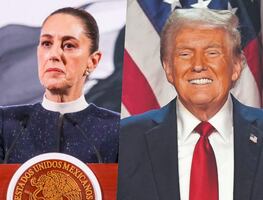Más Información

Dictan 600 años de prisión a "El Negro" Radilla y "El Cone"; responsables de secuestrar al hijo de Javier Sicilia

Familias de desaparecidos en Mazatlán irrumpen en evento de Sheinbaum; mandataria promete atender peticiones

Sheinbaum responde a Trump sobre declarar a cárteles como organizaciones terroristas; rechaza injerencia extranjera

PAN exige renuncia de Rubén Rocha Moya; Claudia Sheinbaum sigue protegiéndolo en “complicidad vergonzante”
Because of the decline of the United States worldwide influence, there is no shortage of candidates to take advantage of the opportunities present on the global stage. China stands as a champion of multilateralism and global trade, while the European Union aims to become once more the model of the Western world. And an unexpected visitor, Russia , struggles to regain diplomatic centrality.
Vladimir Putin
arrives at the G20 Summit in Hamburg with discomfort due to his participation in the Ukraine war since 2014 . Moscow knows that the possibilities of a pact with Europe are scarce. That is why it has turned its eyes towards the East . This trend is visible in Syria, Egypt, and Turkey , where Russia has taken advantage of the fact that Washington's influence in these countries has become diffuse. It has also found a way to get closer to China with the North Korean crisis.
Ilan Goldenberg and Julie Smith
state in Foreign Policy that this trend began when Barack Obama 's administration was overwhelmed by the proliferation of conflicts in the Middle East . Putin exploited the situation and scored a victory by launching his successful intervention in Syria in 2015 supporting Bashar al-Assad.
Russia has not given up its own agenda in the region and has begun to combine it with approaches to Washington's historic allies.
A paradigmatic case is that of Turkey . In recent years and despite some friction between Ankara and Moscow, the old rivals have approached as Turkish President Recep Tayyip Erdogan distanced himself from the US. Putin has received the Turkish president in Saint Petersburg and they have cooperated in joint actions against jihadism.
Egypt
represents a similar case. Until recently, it was Washington's regional ally, but Putin has strengthened ties with Marshal Abdel Fatah al-Sisi , taking advantage of the US's discomfort with the tyrannical excesses of the military in the Arab Spring .
"Russia's worldwide influence has been declining since the end of the Cold War . Putin has only managed to slow down this decline," explains Javier Morales , a professor at the European University of Madrid. Its role would be limited to that of a regional power, especially in Eastern Europe and the republics of Asia belonging to the extinct Soviet Union.
Tensions between the US and North Korea have also given Russia a chance to ally with China. The launch of a North Korean missile on July 3 coincided with Chinese President Xi Jinping 's visit to Moscow. The two countries issued a statement urging the US and the two Koreas to negotiate a pact in which Pyongyang pledges to freeze its nuclear program if Seoul and Washington reduce their military presence in the region.
But outside its territories of natural influence, Russia continues to have reasons to feel like an international pariah . Last week, the EU extended the sanctions to the country for 6 more months , adding to its limping economy. It is sufficient to remember that, according to the World Bank , in 2015 the Russian GDP amounted to USD$1.326 billion , slightly above to that of a nation like Spain.
Morales believes that the US should not fear for its hegemony: "While it is true that the attitude of the US president seems to undermine the credibility of his country, its world leadership relies on many other factors, such as economic and technological development or cultural influence. "
In the opinion of the professor, Moscow also does not trust that the Trump era would be truly beneficial to its interests. "There is simply a sense of relief because if Clinton had won, there would have been diplomatic confrontations . But Trump, without being openly hostile to Russia, also worries the Kremlin. For example, increasing the military budget would boost their advantage over the Russian armed forces and Trump's own ignorance on international politics creates uncertainty," he explains.
mr






